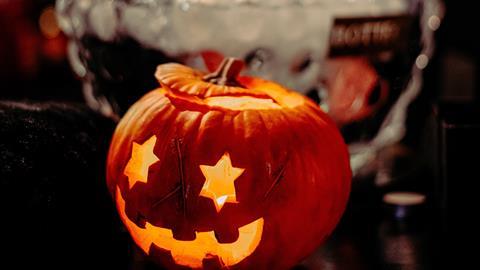Matt Arnold, editor of The Christian Parapsychologist Journal, explores the origins of Halloween and suggests they are firmly rooted in the Church
Much has been written by Christians about the subject of whether or not we should be celebrating Halloween. Some see the celebration as originating in satanic influences and, therefore, should not be touched by Christians who should seek to avoid all forms of evil. I was brought up in this kind of church tradition. However, my God-fearing mother was more laid back, and I remember her decorating the house with cut-outs of witches on broomsticks, pumpkins and ghosts.
Seeking truth
In my early 20s, I was moved to research the origins of Halloween and this has progressed over the last 30 years as more and more information has become available to me. I am a seeker of truth, no matter how inconvenient it is to my existing beliefs, for truth is not interested in how I feel about issues; it just is.
My underlying principle as a truth-seeker is that God will lead us into all truth (John 16:13), that we are to add knowledge to our faith (2 Peter 1:5), and that we are to study to show ourselves approved of God, not being ashamed of our studies to rightly understand God’s word (2 Timothy 2:15). By following Christ, we shall know the truth and it will set us free (John 8:32), free from a spirit of fear and to have a sound mind (2 Timothy 1:7).
Whatever we are as Christians, we must be purveyors of truth. If we’re caught peddling misinformation that is shown to be untrue, how do we expect those who do not know Christ to believe us about the truths of God’s love and hope in Christ? We must reflect upon what is true (Philippians 4:8).
Having stated my premise, we turn to the issue of Halloween.
Read more:
Halloween: scary movies, religious belief and wish fulfilment
Is Halloween harmless fun?
I became a Christian through a Halloween
What is Wicca and how does it differ from Christianity?
Halloween’s origins
The origins of Halloween are often said to be satanic, as we’re told in certain cartoon tracts that portray ancient druids going around asking for children to sacrifice to their lord of darkness, Samhain. We’re told that Halloween is the “devil’s day” and that it cannot be celebrated by Christians. Some Christians will turn to the words of supposed ex-Satanists and self-proclaimed Satanists who make such statements, and they’re accepted without question because of the supposed insider knowledge these people allegedly have.
The actual origins of Halloween are solely rooted in the Church, not any fictitious religious pagan feast from ancient times.
After a few centuries of Christian martyrs under pagan Roman emperors, various churches began celebrating a day to remember and pray for them, similar to Hebrews 11’s roll-call of the departed faithful. The Syrian Church celebrated a martyrs day during Pascha week; the Greek Church similarly celebrated this the first Sunday after Pentecost; the Irish Celtic Church chose April 20th, and the Anglo-Franco-Germanic churches picked November 1st.
609AD saw Pope Benedict III rededicate the Roman Pantheon (pan-all, theon – gods) to become the church of St Mary and All Saints. Such treatment of ancient pagan places is a feature in much of the kingdom-oriented earlier Church that sought not to destroy the past but to refocus it on Christ. For the Roman Church, 13th May was the celebration of All Saints, or as it would later become known, All Hallows.
By 835AD, Pope Gregory IV decided to go with the date of the Anglo-Franco-Germanic churches of 1st November. With the symbolism of death and decay evident in the landscape, it made much sense to choose this time as a time of remembering and giving thanks for the dead and as a reason to have a celebration for people to enjoy at such a dark time. There are no records of a pagan religious festival of Samhain. However, it was a time when clans would gather to do business, slaughter weaker livestock (Bede notes that November was known as Blodmonath, blood-month), and enjoy each other’s company around a bonefire (where the bones of slaughtered livestock would be burned to ash, which could be used for making clothing and soap).
Genuine evil?
As to the influence of supposed ancient satanic druids, this is not found in any written history. The only recorded accounts regarding ancient druids in Britain are from the Roman historian Tacitus and the Christian convert Minicus Felix, who spoke of the druids sacrificing babies, drinking blood and other such horrible activities. Was this true, though? History is written by the winners, and we saw similar “othering” of groups of humans during the First World War, where the British public was told that the Germans ate babies!
If the ancient druids were so evil, why did St Columba, the Irish evangelist to Scotland, write “Mo drui, Mac Dé”, which translates as “My druid [is Christ], the Son of God”. To St Columba, the druids were holy people, and Christ was the most holy person, his “archdruid”. Even back then, we see the seeds of the sin of bearing false witness against our neighbours being planted, which have grown over the years to produce its sinful fruit of false witness against our modern-day neo-Pagan practitioners, labelling them as “Satanists” and “baby sacrificers”.
In my experience of eleven years of travelling with my Pagan friends, I have never seen any human sacrifices – they eschew such behaviours, as they are very much for life: animal, vegetable and mineral.
Get access to exclusive bonus content & updates: register & sign up to the Premier Unbelievable? newsletter!
Haloween costumes
Even today’s consumer-driven dressing up in scary costumes is rooted in Christianity. The Christian-inspired Danse Macabre, which taught that no matter what strata of society you were in, you’d eventually die, involved dressing up like the dead and the living and dancing together, showing that death is ultimately swallowed up in victory.
In the 16th Century, this combined with Carnivale’s masked ball celebrations and the practice of souling, where the poor went around their community knocking on doors and offering prayers for the departed in return for food in the form of soul cakes. Shakespeare records this practice in his Two Gentlemen of Verona with the words “Like a beggar at Hallowmas”.
This practice morphs into guising, where children would go around singing at homes in return for treats. Whatever we think about the scary costumes people dress up in (and I’m not speaking about those created for pure titillation), we should not forget that dressing up is rooted in the symbolic victory of life over death. Every single person dressed up is alive, despite the clothing they wear.
So, enjoy Halloween, the great Christian festival of remembering the dead. All Hallows allows us to reflect upon those in our families and communities who have passed beyond the veil and to give thanks for their lives and positive influences on our own. It allows us to share food and fellowship generously with our neighbours, meeting people we might not have met before as they bring their children to our doors. If you wish to give out tracts, please read them, checking if they’re age-appropriate (even if they are cartoons) and avoid passing on misinformation (which doesn’t glorify God).
My own Halloween will be spent enjoying the festivities of the season, secure in the knowledge of the origins of the festival and its customs. But, it will be tinged with a joyful sadness as I remember the loss of my own mother earlier this year. My celebration of Halloween will be as per the original All Hallows celebration, with a short liturgy and the lighting of a candle and praying for her as one who is alive in Christ and part of the one body of Christ (as I would pray for anyone who is still in the flesh). I will share stories of her and how her influence brought me under the lordship of Christ, giving thanks for her.
So, go into all the world, remembering Christ won the victory over death and now has the keys of Death and Hades, and so can keep our departed loved ones safe. Hallelujah!
Matt Arnold is the editor of The Christian Parapsychologist Journal, a publication of the Churches Fellowship for Psychical and Spiritual Studies. He is also a member of the Association for the Scientific Study of Anomalous Phenomena, the Alister Hardy Trust and the Ghost Club (1862). He is researcher and writer for www.GhostsGhoulsAndGod.co.uk and has written a book, The Invisible Dimension: Spirit-Beings, Ghosts and the Afterlife, A Biblical Perspective Based on Historical Context and the Original Languages, which is being published in time for Christmas.
























